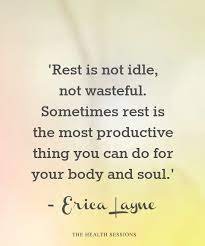Rest and Yoga
What is rest?
The dictionary definition of rest is:
As a verb is “cease work or movement in order to relax, sleep, or recover strength”.
As a noun is “an instance or period of resting”.
Daily life can be a series of stimulations. These can be it wanted and not. There can be a constant string of noises all day long from alarm clocks, to phone and email notifications, lawnmowers, washing machines, dogs barking, children talking, road noises – the list is long. That is just one of our senses being bombarded on a daily basis. If we add in to it sights, smells, touch, it can be no wonder that we feel exhausted a lot of the time.
However rest doesn’t have to mean lying about on your own doing nothing. It can be active, enlivening, enjoyed with others. It can take different forms. Just like you know that each and every one is individual, rest is the same. Rest for you could be completely different to rest to the person next to you.
Why rest matters?
There are many benefits to resting.
Rest helps improve the quality of your sleep
Rest recharges your batteries to help you deal with the challenges of life
Rest deepens your capacity to emphathise with others
Rest improves your immune system
Rest helps you find perspective, process emotions and heal
Rest helps you to develop the ability to access a state of calm in times of stress, anxiety, loss and change
Rest gives your body physical restoration and regeneration – reducing the number of injuries you might suffer
Rest clear and refreshes the mind, boosts your concentration, improves your problem solving, creativity and will power.
Without rest you are more prone to illness, disease, accidents, aches and pains and more.
Why do we resist it?
If rest has so many benefits then why do so many struggle with it. Many of you may find it difficult to rest, have a disconnect with what rest actually means or have a poor relationship with rest.
Our reluctance to rest is deep rooted in our hunter-gathering times when we have to work together to be able to survive. In this situation it was incredibly undesirable to been seen as not helping, which then also generated a fear of being cast out if we weren’t pulling our weight.
Add into this the fact that “sloth” is one of the seven deadly. This message taught to us over the years by the church. Failure to be productive and contributing to society resulting in going straight to hell.
Society now praises productivity and achievement – it has given rest a bad rap!
Perhaps you need to look at new ways to refer or think about what it means to “rest”. What about:
Renew
Recharge
Recuperate
Replenish
Reset
Recalibrate
Regenerate
Centre
Chill
Energise
Sometimes a change of perspective of “what” rest is and “how” you rest can might be all you need.
The 8 Pillars of rest
“Life is a balance between holding on and letting go” - RUMI
In the book “Rest of Reset” by Suzy Reading, Suzy describes the 8 pillars of rest. This recognises that one size doesn’t fit all whether that is exercise, nutrition, comedy, parenting, learning styles, or rest.
She acknowledges that you all have your own needs, goals, preferences, interests, strengths and sensitivities. That is what makes you all wonderfully uniquely you! SImilalry, what makes you-you today, might be different to tomorrow. What you need today, is possibly different to what you need tomorrow.
Therefore you need to approach rest with the same mindset. You can categorise rest as follows:
1. Passive-Active
2. Mental
3. Physical
4. Social
5. Spiritual
6. Sensory
7. Emotional
8. Creative
Within each one of these categories you have a range, not one of them is any more important than the other and they don’t need to be considered a continuum. For example, physical rest might mean going for a walk if you have been stationary all day, or bringing stillness if you have been vigorously active. Equally you don’t need to balance say 20 min of stillness with 20 mins of movement. You also don’t need to be doing all of them all the time.
These pillars might not be your pillars, you might need to tweak them. Pillars of rest of concrete, practical ways that help to bring your body and mind back into balance.
The tools of yoga and meditation to help
"Yoga is the balance between effort and surrender, strength and flexibility"- Patanjali
Your yoga and meditation practices give you tools that can come into one or more of those pillars. They provide you with the opportunity to move or be still, to practice sense withdrawal with pratyahara or use your senses to be more present. Yoga sequences can be used to energise and uplift or they can be soothing and restorative. You can practice on your own or in a class depending on your social needs. They help you acknowledge your emotions and work with them, or to take your focus elsewhere for a while. They can be challenging and new or they can be comforting and familiar.
Hatha yoga practices balance activity with stillness throughout a session. The Yoga Sutras of Patanjali form the basis of these practices. In his writing Patanjali states "Yoga is the balance between effort and surrender, strength and flexibility,". In this he perfectly captures the essence and philosophy of practicing yoga. It suggests that true yoga goes beyond physical postures, emphasizing the importance of finding harmony within oneself.
Yoga and meditation help to bring awareness into your experience of life and determine what it is that you need to be able to bring you into balance.
In conclusion
Rest if a vital part of our daily life. Without it you are prone to disease, sleep disorders, aches and pains, brain fog and more. But rest doesn’t have to mean “lying on your own and doing nothing”.
Rest isn’t a reward for the work; it’s part of the work – Leesa Renee Hall
Rest is about bringing you back into balance, about pressing reset, in a way that works for you. There are various different ways to categorise rest. Within those categories there is a pendulum that swings back and forth. Where the pendulum stops for your “rest” depends on what has been occurring for you at any particular moment in time. It might be that on any given day that your rest will require work and effort in order to achieve it.
You might need to get creative with what your rest looks like and redefine the definition! How would you overcome inertia of being still all day, or how would you apply the brakes if you are constantly doing? One of the ways that I bring rest into my life is by knitting – it enable me to stop moving around, it focuses my mind and helps me disconnect before going to sleep. For others it might be reading, dancing to music in the kitchen.
Yoga and meditation are great tools to use to be able to help reinvent how you rest, or even to just help open you up to a new way of thinking.
When you approach rest from a new perspective of recharging, re-energising, re-balancing your being then you can let go of the guilt and the need to always be producing. You can create a new healthy relationship with rest.
“Don’t equate “doing your best” with productivity or people pleasing. Doing your best can be noticing you need a break and taking one” – Suzy Reading






